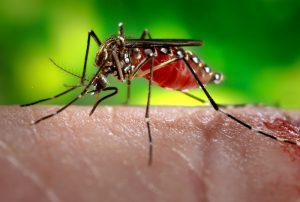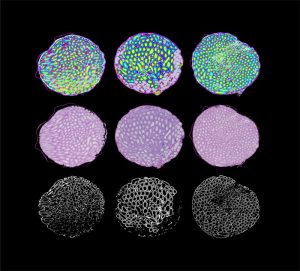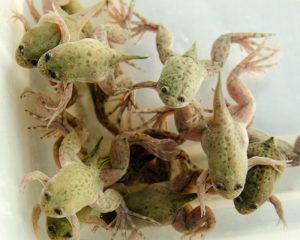Enter your address to receive notifications about new posts to your email.
Articles tagged Genetics of Sex
(18 results)
-
Science & Publishing
Block party on the zebrafish sex chromosome
Research in G3 identifies a gene regulatory block of the zebrafish genome responsible for overseeing the maternal-to-zygotic-transition.
-
An evolutionary scandal ends
Guest post by Charles H. Langley. Dic, hospes, doctis caelebs animalculum obisse hicque iacere physis legibus conveniens. (Stranger, tell the learned that the celibate little animal has passed away, and lies here, conforming to the laws of nature.) —John Rundin, with apologies to Simonides and Cicero Thirty-five years ago, in a celebrated News & Views…
-
An ancient regulator of sex development
A Wnt protein involved in the formation of the human ovary plays an important role in female zebrafish sex development. Even though zebrafish are a well-studied research model, how these fish develop into males or females remains rather obscure—in part because the sex of lab strains is not determined by sex chromosomes. Research published…
-
Athlete’s foot fungus varies little around the globe
Sexual reproduction is scarce in skin infection culprit. While some people love to feel the burn during a workout, we generally seek that sensation in our muscles—not our feet. Treading barefoot in damp, communal environments like gym showers and the perimeters of pools can expose us to the fungus Trichophyton rubrum, the most common cause…
-
Sperm and eggs don’t always join at random
Choosing a mate is hardly random. During courtship in the diploid phase of our life cycle, we often employ elaborate rituals and biological signals to attract and assess potential mates. But after that, we usually assume that eggs and sperm choose each other randomly at fertilization. Or so says Mendel’s First Law. But sometimes, Joseph…
-
Frontiers of Knowledge: An Interview with 2017 Edward Novitski Prize Recipient Jonathan Hodgkin
The Genetics Society of America’s Edward Novitski Prize recognizes a single experimental accomplishment or a body of work in which an exceptional level of creativity and intellectual ingenuity has been used to design and execute scientific experiments to solve a difficult problem in genetics. The 2017 winner, Jonathan Hodgkin, used elegant genetic studies to unravel…
-
Fast-evolving female-biased genes defy expectations in mosquitoes
Genes involved in male reproduction tend to evolve rapidly. This has been observed in many different species and is thought to be due to sexual selection as males compete over mating opportunities. But in the August issue of GENETICS, Whittle and Extavour present results that flip this paradigm upside down. They find that in the…
-
Behind the cover: Male infertility in the mouse Collaborative Cross
Fascinating discoveries sometimes emerge from the most daunting of experimental roadblocks. Designed to generate over 1,000 recombinant inbred mice lines for genetic mapping, the Collaborative Cross (CC) project unearthed astounding variation in male fertility when nearly 95% of the highly inbred CC lines went extinct. As part of the Multiparental Populations series in the June…
-
Jonathan Hodgkin awarded the 2017 Novitski Prize
We are pleased to announce that Jonathan Hodgkin, PhD is the 2017 recipient of the Edward Novitski Prize in recognition of his extraordinary creativity and intellectual ingenuity in solving significant problems in genetics research. Hodgkin uncovered the sex determination pathway in Caenorhabditis elegans, an important and widely used model for animal development and genetics. His…
-
Sex chromosome turnover in frogs hints at evolutionary patterns
Sex chromosomes have evolved from autosomes hundreds of times across the tree of life. In mammals, sex is controlled by the Y chromosome-linked gene SRY, which triggers the development of male anatomy. Sex determination in most mammals is extremely conserved; essentially all marsupials and placental mammals share the same pair of X and Y chromosomes…
-
Nettie Stevens: Sex chromosomes and sexism
At the time of her death in 1912, Nettie Maria Stevens was a biologist of enough repute to be eulogized in the journal Science by future Nobelist Thomas Hunt Morgan and for her passing to be noted in The New York Times. In 1910 she had been listed among 1,000 leading American “men of science.”…











